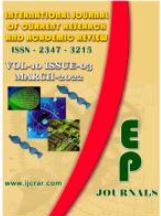Abstract Volume:10 Issue-3 Year-2022 Original Research Articles
 |
Online ISSN : 2347 - 3215 Issues : 12 per year Publisher : Excellent Publishers Email : editorijcret@gmail.com |
Biochar is produced in an environmentally friendly manner by recycling plant waste. Due to its stable aromatic forms of organic carbon, biochar is designed to be applied to soil and is relatively stable against microbial breakdown under varied environmental conditions. Biochar is being studied around the world as a way to improve soil fertility, ecosystem services, and carbon sequestration. The use of biochar as a source of soil nitrogen has been the topic of much research. Nitrogen is an important element in crop growth. The objective of this review paper, therefore, is to emphasize both existing knowledge and prospective mechanisms of biochar amendment effects on soil microbial and nitrogen transformation. Biochar addition was found to have significant impacts on the composition and abundance of soil microbial communities. Biochar application improved N2 fixation in common bean compared to the control treatment. Biochar application to soil has previously been found to increase, reduce, or have no effect on N mineralization. In terms of N immobilization, biochar studies have provided conflicting results. Furthermore, biochar's adsorption and cation exchange capacity for NH4+ and NO3- can effectively minimize nitrate leaching and retain nitrogen. Biochar also aerates the soil and provides a habitat for nitrifying bacteria to convert NH4+ to NO3-. These modifications, however, may not be wholly helpful, as biochar is not always effective, and alterations to the nitrogen cycle may have unforeseen consequences. Because the features of biochar are strongly impacted by the pyrolytic conditions used to generate biochar and the type of soil it is employed in, more research into the interaction between biochar and soil chemistry is needed.
How to cite this article:
Ashenafi Nigussie. 2022. Role of Biochar Amendments on Soil Microbial Biomass and Nitrogen Dynamics: Review.Int.J.Curr.Res.Aca.Rev. 10(3): 79-87doi: https://doi.org/10.20546/ijcrar.2022.1003.008



Quick Navigation
- Print Article
- Full Text PDF
- How to Cite this Article
- on Google
- on Google Scholor
- Citation Alert By Google Scholar
